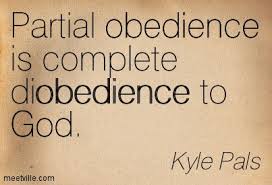Faith outcome and spiritual maturity
Last week we opened with this question: Is obedience the outcome of our faith walk or is it the means by which spiritual maturity is accomplished? The answer we discovered is that obedience is BOTH.
During our faith walk (which will continue until this life ends), our choice to either obey or disobey God will result in “life lessons” that will make us stronger instruments of God. Through these lessons we “grow” or mature spiritually.
Oswald Chambers shared this thought on obedience and spiritual maturity.
Spiritual maturity is not reached by the passing of the years, but by obedience to the will of God. Some people mature into an understanding of God’s will more quickly than others because they obey more readily; they more readily sacrifice the life of nature to the will of God.
A lesson in obedience
Let me detail the correlation between obedience and spiritual maturity with the following illustration.
A toddler, immature physically and mentally, has one basic desire—to satisfy their immediate needs. They will do just about anything to have their way, disregarding safety, or well-being along the way. This includes climbing up on high counters or grabbing objects that are dangerous to their health, i.e., laundry pods.
Toddlers show little concern for their own safety or well-being if the result is physical satisfaction. They are best served and protected by their guardian who will provide for and protect them. Toddlers must be taught to obey the direction of their guardian who will help them to gain a healthy fear of the world they live in.
Is obedience only for children?
Spiritually, the toddler illustration can also be true for believers. Oftentimes, we live in the moment—desiring what will immediately satisfy our needs. In that moment perhaps the Holy Spirit is directing us to “pray and wait” or to seek godly counsel through others or the Bible.
Many times, we will even fain obedience (fake it) by responding “I’m praying about it” when we already know what God has directed us to do. Ours is just to obey. Such was the case with Jonah.
Now the word of the Lord came to Jonah saying, “Go at once to Nineveh and cry out against it.” But Jonah set out to flee to Tarshish from the presence of the LORD. (Jonah 1:1-3)
Reluctant obedience = disobedience
Jonah was reluctant to bring God’s message to Nineveh, the capital of Israel’s hated enemy, Assyria. Foolishly, he thought he fled from the presence of the Lord (Psalm 139:7-10).
God was very clear in His instruction to Jonah. “Go at once” and “Cry out against Nineveh”. He was without excuse, yet he chose to be disobedient. The Lord did not allow him to escape.
Jonah eventually acquiesced. God’s purpose was accomplished. Nineveh repented (Jonah 3:10). But unfortunately, Jonah failed to mature spiritually (Jonah 4:3-4). He was unsuccessful in understanding the nature of God and His mercy (Exod. 33:19).
Practicing mature obedience
Like Jonah, do we often find ourselves running from the presence of the Lord? Is God asking us to respond to a divine directive we prefer not to do? This is a great place to begin practicing mature obedience.
We practice mature obedience by first seeking God’s will through reading and meditating on His Word. This will then move us naturally into prayer based on what we have read. We have the assurance of the Holy Spirit to “guide us in all truth and to glorify God” (John 16:13, 14).
Finally, we must quickly respond to what God has instructed us to do. We must obey. Hesitation is often the result of doubt, which soon leads to disobedience. Mature obedience can be practiced every day. It begins with a willing heart that is swift to say, “Yes, Lord.”




